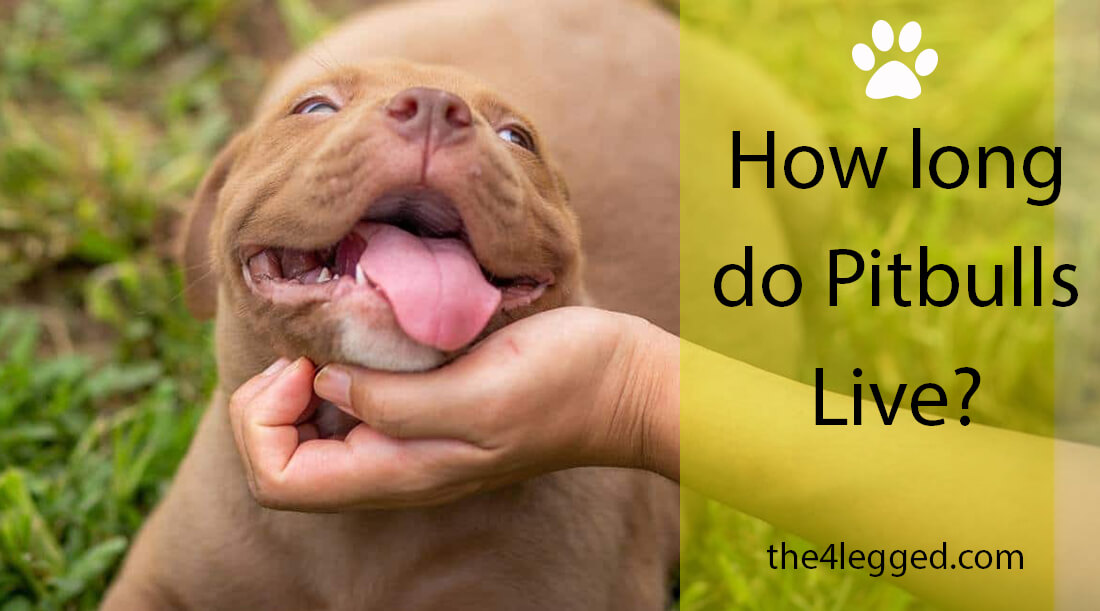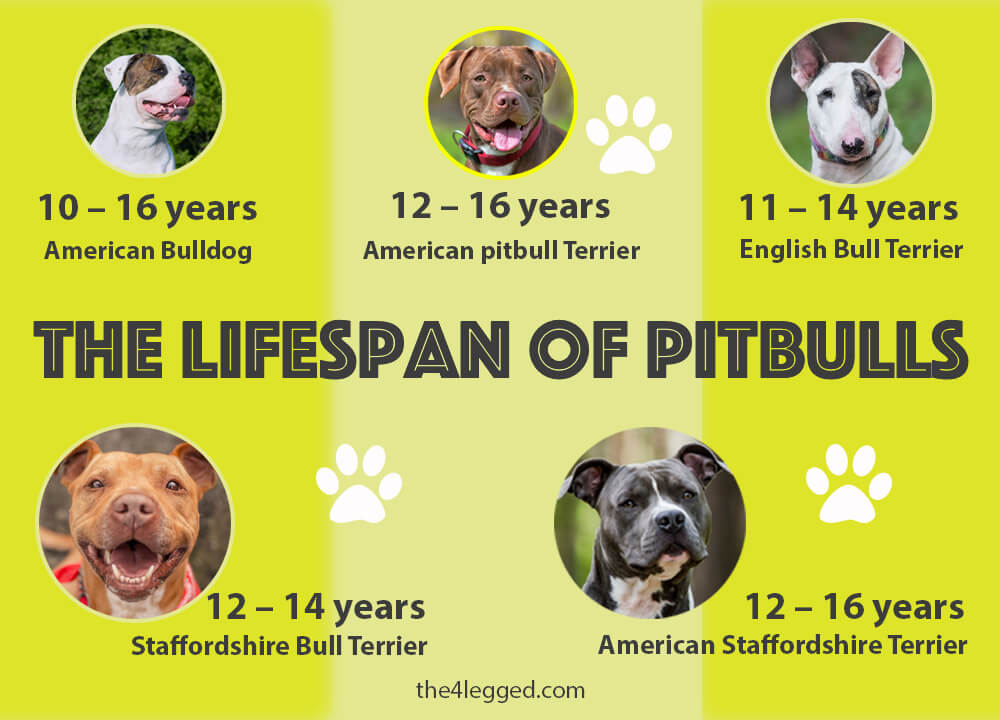If you’re considering adding a Pitbull to your family or are simply curious about their lifespan, it’s important to understand how long these beloved dogs typically live. This article will provide insights into the average lifespan of Pitbulls and factors that can influence their longevity. What are you waiting for? Let’s dive in and explore the question: how long do pitbulls live?
How long do Pitbulls Live? – The Lifespan Of Pitbulls
Pitbulls are a popular breed of dog, known for their loyalty and strength. But just how long do they live? The average lifespan of a pitbull is between 12 to 14 years, but this can vary depending on various factors such as genetics, diet, exercise, and overall health.
Unfortunately, it is not entirely correct to say that all Pitbulls live an average of 12 or 14 years. On average, a Pitpull can live for 12 to 15 years. This depends on other factors, including genetic composition, lifestyle, and care.
This detailed list outlines the differences between Pitbulls breeds and their longevity.
We have already helped you to know how long your Pitbulls will live, but you should also know some information to help your Pitbulls live longer.
Tips to Maximize Your Pitbull’s Lifespan
By letting your dogs live in the environment that is most suitable for you, Pitbull, they will have a better chance to live a long and healthy life with you. We will provide you with essential tips to help your Pitbull live a long and healthy life. Follow these guidelines to ensure your furry friend thrives and enjoys every moment by your side.
Check breeders
If you get a Pitbull from a breeder, you should take a comprehensive health check to see them to ensure that they have no genetic defects.Through research, you can avoid keeping an animal, which can cost you thousands of dollars for veterinary care and shorten your lifespan.
 Healthy diet
Healthy diet
Feed your Pitbulls a healthy diet that provides all the protein and nutrients they need for growth and longevity. By adopting the right healthy diet, you can reduce the chances of your dog developing obesity or other diseases that can increase their lifespan.
Feeding Guidelines for Pitbulls: A balanced diet is crucial for your Pitbull’s overall well-being. Follow these feeding guidelines to ensure your furry friend receives optimal nutrition:
a) High-Quality Food: Choose a premium dog food that meets the specific nutritional needs of Pitbulls, such as a protein-rich diet that supports muscle development.
b) Portion Control: Feed your Pitbull according to their age, weight, and activity level to maintain a healthy weight and prevent obesity.
c) Meal Schedule: Establish a consistent feeding schedule to regulate their metabolism and promote proper digestion.
You can check the best dog food for Pitbull puppies in here, reviewed by Experts.
Ensure regular exercise
Pitbull is an active dog and needs daily exercise. This not only benefits their overall health, but also prevents them from chewing on your personal belongings or exhibiting other destructive behaviors. Regular exercise will maintain muscle health and exercise, improve circulation and joint flexibility. Engage your Pitbull in activities such as brisk walks, jogging, or playing fetch to burn off excess energy and keep them physically fit.
Go see your veterinarian
Having a Pitbull is a task that requires regular veterinary care. Adequate vaccination can help extend their lifespan.Regular monitoring of each common disease can help you solve problems before they worsen.
Consider Pet insurance
Some homeowners provide Pet insurance for their Pitbull. You may not think this is to extend their life, but if you face expensive veterinary bills in the future, buying Pet insurance can greatly reduce your total cost.
Pitbulls Puppy Care Tips:
Providing a solid foundation for your Pitbull’s health starts from the moment you bring your puppy home. These puppy care tips will set them on the right track for a long and vibrant life:
a) Veterinary Care: Schedule regular check-ups and vaccinations to monitor your puppy’s health and prevent potential illnesses.
b) Proper Nutrition: Feed your puppy a high-quality, breed-specific puppy food to support their growth and development.
c) Socialization: Introduce your Pitbull puppy to various people, animals, and environments to promote confidence and positive behavior.
By implementing these tips, you can optimize your Pitbull’s lifespan and ensure they lead a happy, healthy, and fulfilling life.
Common Health Issues in Pitbull and How to Prevent Them
Here are the most prevalent health issues in Pitbulls and some effective strategies to keep your furry friend healthy and thriving. By following these preventive measures, you can ensure a long and happy life for your beloved Pitbulls.
Obesity and Weight Management
One of the most significant health issues facing Pitbulls is obesity, which can lead to a range of other problems.
To prevent obesity:
a) Balanced Diet: Feed your Pitbull a high-quality dog food that meets their specific nutritional requirements. Measure portions and avoid overfeeding.
b) Avoid Table Scraps: Resist the temptation to give your Pitbull human food, as it can lead to weight gain and other digestive issues.
c) Regular Exercise: Establish a consistent exercise routine, including daily walks, play sessions, and interactive games to keep your Pitbull physically fit.
Skin Allergies and Dermatitis
Pitbulls are prone to various skin allergies and dermatitis. To prevent and manage these conditions:
a) Regular Grooming: Brush your Pitbull’s coat regularly to remove loose hair and prevent matting. Bathe them using a mild, hypoallergenic shampoo suitable for dogs with sensitive skin.
b) Allergen Identification: Identify and avoid potential allergens such as certain foods, pollen, dust mites, or fleas. Consult your veterinarian for allergy testing if necessary.
c) Environmental Control: Keep your home clean and free from potential irritants, such as chemical cleaners or strong fragrances. Provide a clean and comfortable sleeping area for your Pitbull.
Hip Dysplasia and Joint Issues
Pitbulls can be susceptible to hip dysplasia and other joint problems. To minimize the risk:
a) Weight Management: Maintain a healthy weight for your Pitbull to reduce stress on their joints. Avoid overfeeding and provide regular exercise to keep their muscles strong.
b) Joint Supplements: Consult your veterinarian about adding joint supplements such as glucosamine and chondroitin to your Pitbull’s diet.
c) Gentle Exercise: Avoid high-impact activities that can strain their joints. Instead, focus on low-impact exercises like swimming or controlled walks to keep them active without risking injury.
Heartworm Disease:
Heartworm disease is a serious and potentially fatal condition transmitted by mosquitoes.
To prevent heartworm infection:
a) Regular Preventive Medication: Administer monthly heartworm preventive medication as prescribed by your veterinarian.
b) Mosquito Control: Minimize your Pitbull’s exposure to mosquitoes by keeping them indoors during peak mosquito activity hours and using mosquito repellents recommended for pets.
c) Annual Testing: Schedule annual heart worm tests to detect any early signs of infection and ensure timely treatment if necessary.
Don’t miss out: When do Pitbulls stop growing? All you need to know about Pitbull growth
Q&A about Pitbull’s lifespan
How Old Was the Oldest Pitbull That Ever Lived?
A: The oldest recorded Pit Bull is named Grandpa, who lived to be 23 years old.
How to Identify the Age of Your Pitbull in Human Years?
To estimate the age of your pit bull in human years, you can use a general guideline that relates the stages of a dog’s life to human aging.For Example, Puppy Stage (0-1 year): Every month of a puppy’s life can be roughly equivalent to one year of human life. So, a six-month-old puppy would be around the age of a 5-year-old child.
Can a Pitbull live for 20 years?
While it is uncommon for Pitbulls to live up to 20 years, it is not impossible. The average lifespan of a Pitbull typically ranges between 10 to 14 years. However, there have been cases of pit bulls and other dog breeds living into their late teens and even reaching 20 years of age.
Does the development process of Pitbull affect life expectancy?
Yes, the development process of pit bulls can have an impact on their life expectancy. Proper development and care during the early stages of a pit bull’s life can contribute to their overall health and longevity.
Does being overweight Pitbull affect life expectancy?
Yes, being overweight can significantly impact the life expectancy of pit bulls, as it does for most dog breeds. So you have to control their diet and have a diet suitable for your Pitbull.
A final thought
I hope with these shares you have answered the question of how long Pitbulls dog live and all the useful tips to help Pitbull dogs always live a healthy and happy life. If you are a Pitbull dog owner, or do you have any other suggestions to help other pet owners have more knowledge to take care of their beloved dog. Leave a comment and we’ll work it out together.



 Healthy diet
Healthy diet

